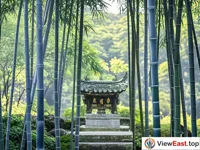







A. Scenic Spot Introduction
Putuo Mountain: The Holy Island of the Orient
Off the eastern coast of China, in the Zhejiang Province's Zhoushan Archipelago, lies an island that is not only a treasure trove of natural beauty but also a sacred site of Buddhist culture. Putuo Mountain, known as the "Sacred Isle of the Sea and Sky," has become a pilgrimage destination in the hearts of tourists and the devout due to its unique geographical location and profound religious significance.
Natural Beauty:
The natural scenery of Putuo Mountain unfolds like a tranquil seascape. The island is characterized by undulating hills, lush forests, pristine beaches, and clear waters. In spring, the island bursts into bloom; in summer, the sea breeze brings a refreshing coolness; in autumn, the red leaves on the mountains contrast beautifully with the azure sea; and in winter, despite the cold, the waves continue to crash against the shore, presenting a unique kind of grandeur.
Historical Culture:
Putuo Mountain is one of the four famous Buddhist mountains in China, renowned for its veneration of the Bodhisattva Guanyin. The temples, grottoes, and inscriptions on the island bear witness to its Buddhist heritage. Every year, countless believers and visitors come here in search of spiritual purification and tranquility.
Cultural Characteristics:
The cultural characteristics of Putuo Mountain are reflected in its Buddhist culture. The monks, devotees, and various Buddhist activities on the island all showcase Putuo Mountain's unique religious atmosphere. Additionally, the island's fishing culture is also a significant feature, with the lifestyle and traditional customs of the fishermen adding a touch of life to Putuo Mountain.
Unique Experiences:
At Putuo Mountain, you can experience the serenity and harmony of the "Sacred Isle of the Sea and Sky." In the early morning, you can listen to the sound of the tide by the sea, feeling the rhythm of nature; during the day, you can visit the temples to experience the solemnity of Buddhist culture; and in the evening, you can watch the sunset from the mountaintop, experiencing the magnificence of the sea and sky merging into one.
Stories and Metaphors:
Putuo Mountain is like a benevolent elder, quietly guarding this expanse of sea. Each rock and every beach seems to narrate an ancient Buddhist tale. And when you stand on the summit of Putuo Mountain, you might feel as if you are in a tranquil Buddhist realm where all worldly troubles are carried away by the wind.
B. Travel Suggestions
Transportation Routes:
Starting from major cities in China, you can travel to Zhoushan City by plane, high-speed train, or car. Zhoushan City has an airport and a ferry terminal, making it easily accessible. Upon arrival in Zhoushan, you can take a direct ferry to Putuo Mountain.
Tourism Convenience:
The tourism facilities around Putuo Mountain are well-developed, offering a variety of hotels and homestays for tourists to choose from. Additionally, there are multiple service points within the scenic area that provide catering and rest services.
Accommodation, Food, and Safety:
The safety in Zhoushan City is good, and tourists can enjoy their visit with peace of mind. The local cuisine is primarily seafood-based, with specialties such as Zhoushan hairtail and seafood noodles that should not be missed.
Specialty Cuisine:
In Zhoushan, you can also taste authentic Zhejiang snacks, such as Dongpo pork and Longjing shrimp, which are indispensable parts of experiencing the local culture.